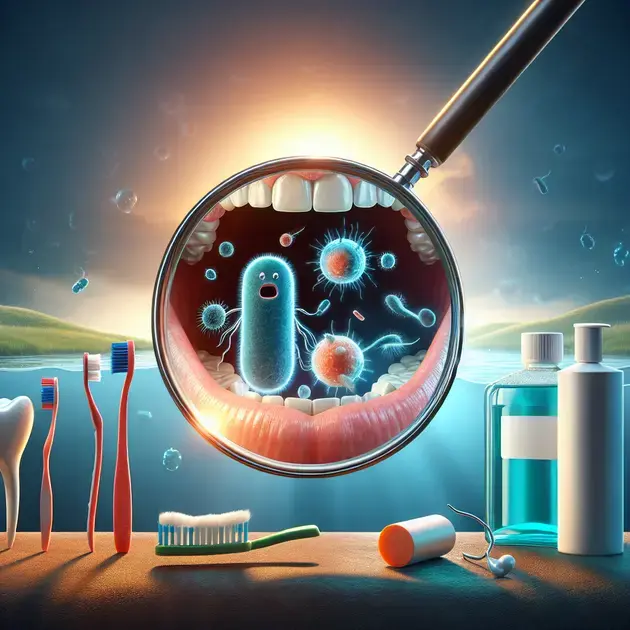Unraveling the Mystery of Bad Breath
Have you ever wondered what causes bad breath and how you can combat it? This article delves into the underlying reasons behind this common issue, exploring various factors that contribute to unpleasant odors emanating from the mouth. From poor oral hygiene to certain medical conditions, understanding the root causes of bad breath is the first step towards fresher breath and improved confidence.

**Common Causes of Bad Breath**
Bad breath, also known as halitosis, can be caused by various factors such as poor oral hygiene, certain foods, dry mouth, or underlying health conditions. One common cause is the buildup of bacteria in the mouth, especially on the tongue and between teeth. To combat this, it is essential to brush and floss regularly to remove food particles and plaque.
Another common cause of bad breath is dry mouth, which can be a result of medication, smoking, or breathing through the mouth. Staying hydrated by drinking plenty of water and using sugar-free gum or lozenges can help stimulate saliva production and reduce bad breath.
Specific foods like garlic, onions, and coffee can also contribute to bad breath due to strong odors that linger in the mouth. Avoiding these foods or brushing your teeth after consuming them can help minimize their impact on your breath.
If bad breath persists despite good oral hygiene practices, it could be a sign of an underlying health issue such as gum disease, sinus infections, or stomach problems. In such cases, consulting with a healthcare professional is recommended to address the root cause of the problem.
For more information on common causes of bad breath and how to address them effectively, you can visit reputable websites like the American Dental Association (ADA) or the Mayo Clinic for comprehensive insights and guidance.
**Tips to Improve Oral Hygiene**
Maintaining good oral hygiene is crucial for preventing bad breath and promoting overall dental health. Start by brushing your teeth at least twice a day with fluoride toothpaste and a soft-bristled toothbrush. Make sure to brush all surfaces of your teeth, including the gumline and tongue, to remove bacteria and plaque.
In addition to brushing, flossing daily helps remove food particles and plaque from between teeth where toothbrush bristles can’t reach. Incorporating an antimicrobial mouthwash into your routine can further help reduce bacteria and freshen breath.
Regular dental check-ups and cleanings are essential for detecting and preventing oral health issues. Dentists can identify early signs of decay, gum disease, or other problems that could contribute to bad breath. Following their recommendations for treatments or maintenance can significantly improve oral hygiene.
Avoiding tobacco products and limiting consumption of sugary or acidic foods and drinks can also benefit oral health and reduce the risk of bad breath. Maintaining a balanced diet rich in fruits, vegetables, and calcium-rich foods can support strong teeth and gums.
For detailed tips on improving oral hygiene and keeping bad breath at bay, resources like the Centers for Disease Control and Prevention (CDC) and the American Academy of Periodontology offer reliable information and advice.
**When to See a Dentist for Bad Breath**
If bad breath persists despite diligent oral hygiene practices and lifestyle changes, it may be time to schedule an appointment with a dentist or healthcare provider. Persistent bad breath could be a symptom of an underlying dental issue such as gum disease, cavities, or oral infections that require professional treatment.
In some cases, bad breath may also be a sign of more serious health conditions like diabetes, respiratory infections, or liver problems. A dentist can perform a thorough examination to determine the cause of the bad breath and recommend appropriate measures to address it.
If bad breath is accompanied by other symptoms such as sore gums, tooth pain, or persistent dry mouth, seeking prompt dental care is crucial. Ignoring these signs could lead to worsening oral health problems and potential complications down the line.
Dentists have the expertise and tools to diagnose and treat a wide range of dental issues that can contribute to bad breath. By discussing your symptoms and concerns with a dental professional, you can receive personalized care and guidance to improve your oral health and freshen your breath.
For more information on when to see a dentist for bad breath and how to find a qualified dental practitioner, reputable sources like the American Dental Association (ADA) and the National Institute of Dental and Craniofacial Research (NIDCR) provide valuable resources and recommendations.

Common Causes of Bad Breath
Bad breath, or halitosis, can have various causes, with the most common being poor oral hygiene. When dental plaque accumulates on teeth and gums, bacteria feed on food particles, leading to the release of volatile sulfur compounds. These compounds are responsible for the unpleasant odor associated with bad breath. Additionally, certain foods like garlic and onions can contribute to bad breath due to their pungent compounds. Dry mouth, which reduces saliva flow and its cleansing effects, can also be a reason behind bad breath.
Other factors that can result in halitosis include infections in the mouth, such as gum disease or tooth decay. These infections can create an ideal environment for bacteria to thrive, causing an offensive smell. Smoking and tobacco use not only stain teeth but also increase the risk of gum disease, which in turn can lead to bad breath. Medical conditions like sinus infections, diabetes, or acid reflux can also play a role in causing bad breath.
To tackle bad breath effectively, it is crucial to address the underlying causes. Maintaining good oral hygiene by brushing teeth twice a day, flossing regularly, and using mouthwash can help eliminate bacteria and food particles responsible for the odor. Drinking an adequate amount of water and chewing sugar-free gum can stimulate saliva production, reducing dry mouth and preventing bad breath.
Visiting a dentist regularly for check-ups and professional cleanings is essential in preventing and addressing bad breath. Dentists can identify any oral health issues contributing to halitosis and provide appropriate treatment. If bad breath persists despite improved oral hygiene practices, seeking medical advice to rule out underlying health conditions is recommended.
Tips to Improve Oral Hygiene
Maintaining good oral hygiene is paramount in preventing bad breath and promoting overall oral health. Brushing your teeth at least twice a day with fluoride toothpaste helps remove plaque and food debris, reducing the risk of bad breath. It is essential to brush all tooth surfaces, including the back molars, using gentle circular motions. Flossing daily is equally important to clean between teeth, where a toothbrush cannot reach, preventing plaque buildup and bad breath.
Using an antimicrobial mouthwash can help kill bacteria in the mouth and freshen breath. When selecting a mouthwash, opt for one that contains fluoride to strengthen tooth enamel and fight cavities. Tongue scraping is another effective way to combat bad breath, as bacteria can accumulate on the tongue’s surface. Gently scrape the tongue from back to front to remove bacteria and food debris.
Ensuring proper hydration by drinking an adequate amount of water throughout the day is crucial for saliva production. Saliva helps wash away bacteria and food particles, reducing the likelihood of bad breath. Limiting sugary and acidic foods and beverages can also contribute to better oral hygiene, as these substances can promote bacteria growth and tooth decay.
Scheduling regular dental check-ups and cleanings with a dentist every six months is key to maintaining optimal oral health. Dentists can identify early signs of dental issues that may cause bad breath and provide personalized recommendations for improving oral hygiene practices. Implementing these tips into your daily routine can help combat bad breath and promote a healthy smile.
When to See a Dentist for Bad Breath
If bad breath persists despite following good oral hygiene practices, it may be necessary to see a dentist for further evaluation. Chronic bad breath, also known as halitosis, can be a sign of underlying dental or medical issues that require professional attention. When the reason behind bad breath is not apparent, a dentist can conduct a thorough examination to identify potential causes.
Dentists can assess the health of your teeth and gums to check for signs of decay, gum disease, or infections that may be contributing to bad breath. They can also evaluate your oral hygiene routine and provide recommendations on improving your brushing and flossing techniques. In some cases, bad breath may be a symptom of more significant health issues, such as diabetes or liver disease, which a dentist can help identify.
If the dentist suspects that bad breath is caused by an oral infection or condition, they may recommend treatments such as deep cleaning, root canal therapy, or gum disease treatment to address the underlying problem. Additionally, dentists can provide guidance on lifestyle habits that may be exacerbating bad breath, such as smoking or a diet high in sugary foods.
Regular dental visits are crucial in maintaining oral health and addressing any concerns, including bad breath. Dentists have the expertise to diagnose and treat oral conditions that may be causing halitosis, helping you achieve fresher breath and a healthier smile. If you are experiencing persistent bad breath, scheduling a dental appointment is a proactive step towards identifying and resolving the issue.
**Conclusion**
In conclusion, understanding the common causes of bad breath is crucial for maintaining oral health and overall well-being. Poor oral hygiene, bacterial buildup on teeth and gums, dry mouth, certain foods, infections, and medical conditions can all contribute to halitosis. Addressing these factors through proper oral hygiene practices, hydration, and regular dental check-ups can help combat bad breath effectively.
By brushing teeth, flossing, using mouthwash, and staying hydrated, individuals can reduce the risk of bad breath caused by bacteria and plaque accumulation. Avoiding foods that contribute to strong odors and seeking professional guidance when necessary are essential steps in managing bad breath.
Knowing when to see a dentist for persistent bad breath is important in identifying and treating underlying dental or medical issues. Dentists can provide personalized care, recommend treatments, and help improve oral hygiene practices to alleviate halitosis and promote a healthier smile.
By implementing tips to improve oral hygiene, staying proactive in seeking professional advice, and maintaining a balanced lifestyle, individuals can take control of their oral health and combat bad breath effectively. Prioritizing good oral hygiene practices and seeking timely dental care can lead to fresher breath, improved oral health, and increased confidence in daily interactions. Remember, addressing the root causes of bad breath is key to achieving long-term freshness and overall well-being.